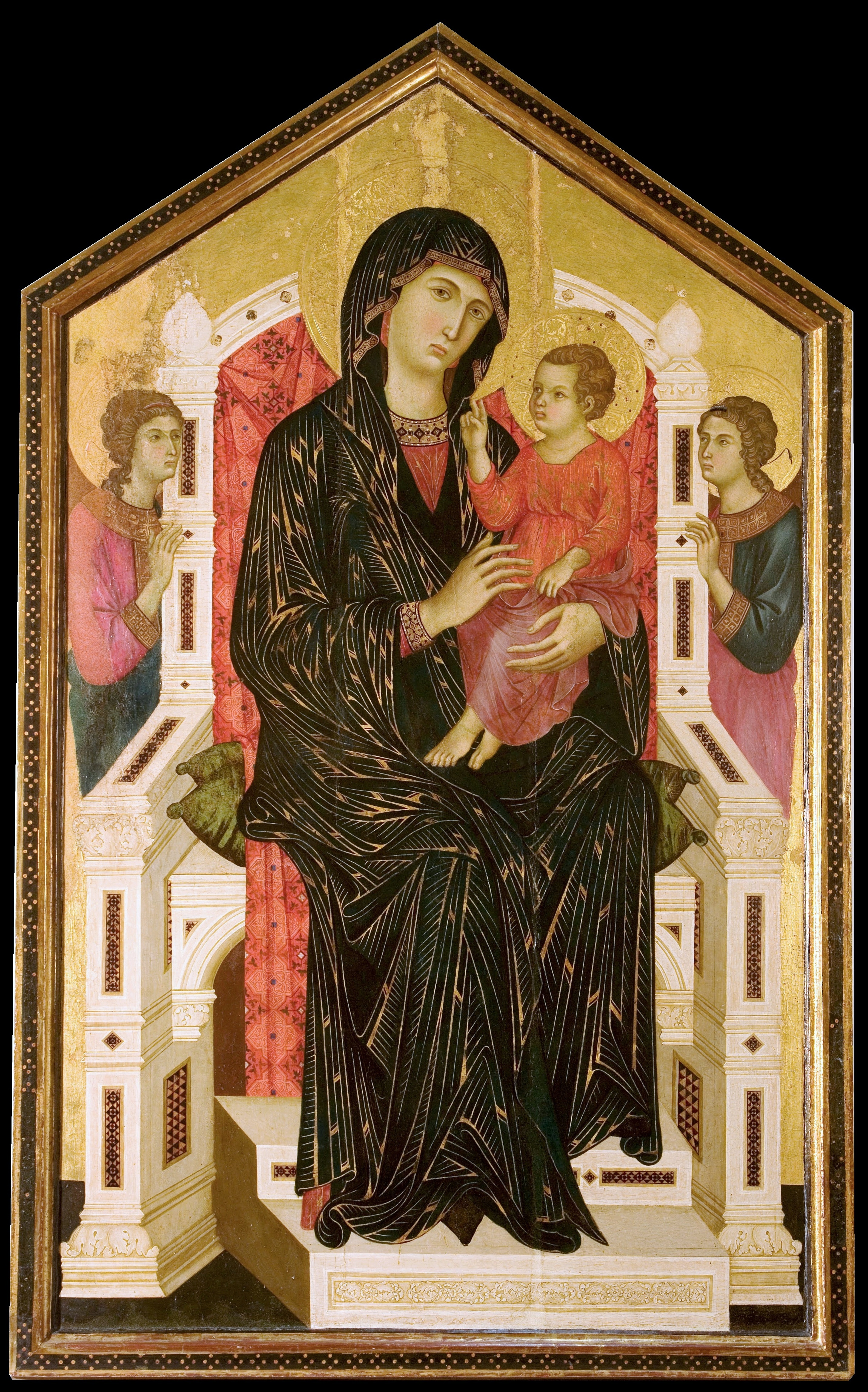|
Ubi Primum (Pius IX, 1849)
''Ubi primum'' is an encyclical of Pope Pius IX to the bishops of the Catholic Church asking them for opinion on the definition of a dogma on the Immaculate Conception of the Virgin Mary. It was issued on February 2, 1849. Background In the 19th century, there was an increase in veneration of Mary under the title " Immaculata". In France, Archbishop de Quélen of Paris actively promoted the devotion of the Miraculous Medal. In 1843 the title "Queen conceived without original sin" was added to the Litany of Loreto, partly through the efforts of Antonio Rosmini, founder of the Institute of Charity. That same year, the twenty-three bishops present at the Sixth Provincial Council of Baltimore chose "Mary conceived without sin" as the patron saint of the United States. Development In 1848 Pius IX established a commission of theologians, to study the subject and report their opinion. Rosmini, who served as a consultor on the commission, suggested that the Holy See should solicit vi ... [...More Info...] [...Related Items...] OR: [Wikipedia] [Google] [Baidu] |
Immaculate Conception
The Immaculate Conception is the belief that the Virgin Mary was free of original sin from the moment of her conception. It is one of the four Marian dogmas of the Catholic Church, meaning that it is held to be a divinely revealed truth whose denial is heresy. Debated by medieval theologians, it was not defined as a dogma until 1854, by Pope Pius IX in the papal bull '' Ineffabilis Deus'', which states that Mary, through God's grace, was conceived free from the stain of original sin through her role as the Mother of God: We declare, pronounce, and define that the doctrine which holds that the most Blessed Virgin Mary, in the first instance of her conception, by a singular grace and privilege granted by Almighty God, in view of the merits of Jesus Christ, the Saviour of the human race, was preserved free from all stain of original sin, is a doctrine revealed by God and therefore to be believed firmly and constantly by all the faithful. While the Immaculate Conception asse ... [...More Info...] [...Related Items...] OR: [Wikipedia] [Google] [Baidu] |
Prosper Guéranger
Prosper Louis Pascal Guéranger (; commonly referred to as Dom Guéranger, 4 April 1805, Sablé-sur-Sarthe, France – 30 January 1875, Solesmes, France) was a French priest and Benedictine monk, who served for nearly 40 years as the Abbot of the monastery of Solesmes (which he founded among the ruins of a former priory at Solesmes). Through the new Abbey of Solesmes he became the founder of the French Benedictine Congregation (now the Solesmes Congregation), which re-established Benedictine monastic life in France after it had been wiped out by the French Revolution. Guéranger was the author of ''The Liturgical Year'', a popular commentary which covers every day of the Catholic Church's Liturgical cycles in 15 volumes. He was well regarded by Pope Pius IX, and was a proponent of the dogmas of the Immaculate Conception and of papal infallibility. Guéranger is credited with reviving the Benedictine Order in France, and with promoting the adoption of the liturgical ... [...More Info...] [...Related Items...] OR: [Wikipedia] [Google] [Baidu] |
1849 Documents
Events January–March * January 1 – France begins issue of the Ceres series, the nation's first postage stamps. * January 5 – Hungarian Revolution of 1848: The Austrian army, led by Alfred I, Prince of Windisch-Grätz, enters in the Hungarian capitals, Buda and Pest. The Hungarian government and parliament flee to Debrecen. * January 8 – Hungarian Revolution of 1848: Romanian armed groups massacre 600 unarmed Hungarian civilians, at Nagyenyed.Hungarian HistoryJanuary 8, 1849 And the Genocide of the Hungarians of Nagyenyed/ref> * January 13 ** Second Anglo-Sikh War – Battle of Tooele: British forces retreat from the Sikhs. ** The Colony of Vancouver Island is established. * January 21 ** General elections are held in the Papal States. ** Hungarian Revolution of 1848: Battle of Nagyszeben – The Hungarian army in Transylvania, led by Josef Bem, is defeated by the Austrians, led by Anton Puchner. * January 23 – Elizabeth Blackwell is awarded he ... [...More Info...] [...Related Items...] OR: [Wikipedia] [Google] [Baidu] |
Documents Of Pope Pius IX
A document is a written, drawn, presented, or memorialized representation of thought, often the manifestation of non-fictional, as well as fictional, content. The word originates from the Latin ''Documentum'', which denotes a "teaching" or "lesson": the verb ''doceō'' denotes "to teach". In the past, the word was usually used to denote written proof useful as evidence of a truth or fact. In the computer age, "document" usually denotes a primarily textual computer file, including its structure and format, e.g. fonts, colors, and images. Contemporarily, "document" is not defined by its transmission medium, e.g., paper, given the existence of electronic documents. "Documentation" is distinct because it has more denotations than "document". Documents are also distinguished from " realia", which are three-dimensional objects that would otherwise satisfy the definition of "document" because they memorialize or represent thought; documents are considered more as 2-dimensional repr ... [...More Info...] [...Related Items...] OR: [Wikipedia] [Google] [Baidu] |
Pope Pius IX Mariology
The pope ( la, papa, from el, πάππας, translit=pappas, 'father'), also known as supreme pontiff ( or ), Roman pontiff () or sovereign pontiff, is the bishop of Rome (or historically the patriarch of Rome), head of the worldwide Catholic Church, and has also served as the head of state or sovereign of the Papal States and later the Vatican City State since the eighth century. From a Catholic viewpoint, the primacy of the bishop of Rome is largely derived from his role as the apostolic successor to Saint Peter, to whom Petrine primacy, primacy was conferred by Jesus, who gave Peter the Keys of Heaven and the powers of "binding and loosing", naming him as the "rock" upon which the Church would be built. The current pope is Pope Francis, Francis, who was 2013 papal conclave, elected on 13 March 2013. While his office is called the papacy, the ecclesiastical jurisdiction, jurisdiction of the episcopal see is called the Holy See. It is the Holy See that is the sovereign enti ... [...More Info...] [...Related Items...] OR: [Wikipedia] [Google] [Baidu] |
Catholic Mariology
Catholic Mariology is Mariology (the systematic study of the person of Mary, mother of Jesus, and of her place in the Economy of Salvation) in Catholic theology. According to the Immaculate Conception taught by the Catholic Church, she was conceived and born without sin, hence Mary is seen as having a singular dignity above the saints, receiving a higher level of veneration than all angelic spirits and blessed souls in heaven. Catholic Mariology thus studies not only her life but also the veneration of her in daily life, prayer, hymns, art, music, and architecture in modern and ancient Christianity throughout the ages. The four Marian dogmas of Mother of God, Immaculate Conception, perpetual virginity, and Assumption form the basis of Mariology. However, a number of other Catholic doctrines about the Virgin Mary have been developed by reference to sacred scripture, theological reasoning and church tradition. The development of Mariology is ongoing and since the begi ... [...More Info...] [...Related Items...] OR: [Wikipedia] [Google] [Baidu] |
Papal Encyclicals
An encyclical was originally a circular letter sent to all the churches of a particular area in the ancient Roman Church. At that time, the word could be used for a letter sent out by any bishop. The word comes from the Late Latin (originally from the Latin , a Latinization of Greek (), meaning "circular", "in a circle", or "all-round", also part of the origin of the word encyclopedia). The term has been used by Catholics, Anglicans and the Eastern Orthodox Church. Catholic usage Although the term "encyclical" originally simply meant a circulating letter, it acquired a more specific meaning within the context of the Catholic Church. In 1740, Pope Benedict XIV wrote a letter titled ''Ubi primum'', which is generally regarded as the first encyclical. The term is now used almost exclusively for a kind of letter sent out by the pope. For the modern Roman Catholic Church, a papal encyclical is a specific category of papal document, a kind of pastoral letter concerning Catholic ... [...More Info...] [...Related Items...] OR: [Wikipedia] [Google] [Baidu] |
Marian Papal Encyclicals And Apostolic Letters
Mariological papal documents have been a major force that has shaped Roman Catholic Mariology over the centuries. Mariology is developed by theologians on the basis not only of Scripture and Tradition but also of the '' sensus fidei'' of the faithful as a whole, "from the bishops to the last of the faithful", and papal documents have recorded those developments, defining Marian dogmas, spreading doctrines and encouraging devotions within the Catholic Church. Popes have been highly influential for the development of doctrine and the veneration of the Blessed Virgin Mary. They made decisions not only in the area of Marian beliefs but also Marian practices and devotions. Before the twentieth century, Popes promulgated Marian veneration and beliefs by authorizing new Marian feast days, prayers, initiatives, and special privileges. Since Pope Leo XIII, Popes have promulgated Mariology also with encyclicals, apostolic letters and with two dogmas (Immaculate Conception and Assumpt ... [...More Info...] [...Related Items...] OR: [Wikipedia] [Google] [Baidu] |
List Of Encyclicals Of Pope Pius IX
A ''list'' is any set of items in a row. List or lists may also refer to: People * List (surname) Organizations * List College, an undergraduate division of the Jewish Theological Seminary of America * SC Germania List, German rugby union club Other uses * Angle of list, the leaning to either port or starboard of a ship * List (information), an ordered collection of pieces of information ** List (abstract data type), a method to organize data in computer science * List on Sylt, previously called List, the northernmost village in Germany, on the island of Sylt * ''List'', an alternative term for ''roll'' in flight dynamics * To ''list'' a building, etc., in the UK it means to designate it a listed building that may not be altered without permission * Lists (jousting), the barriers used to designate the tournament area where medieval knights jousted * '' The Book of Lists'', an American series of books with unusual lists See also * The List (other) * ... [...More Info...] [...Related Items...] OR: [Wikipedia] [Google] [Baidu] |
Fulgens Corona
''Fulgens corona'' ("Radiant Crown") is an encyclical by Pope Pius XII, given at St. Peter's, Rome, on 8 September 1953, Nativity of Mary, the Feast of the Nativity of the Blessed Virgin Mary, in the fifteenth year of his Pontificate. The encyclical proclaims a Marian year for 1954, to commemorate the centenary of the definition of the dogma of the Immaculate Conception of the Virgin Mary. ''Fulgens corona'' is significant as it contained the mariological methodology of Pope Pius XII and his views on limits and challenges of mariology. First Marian year In September 1953, Pope Pius XII inaugurated the Roman Catholic Church's First Marian Year, or "Little Holy Year," devoted to the Virgin Mary who had always been the object of his special veneration. He announced the Marian Year in his encyclical letter ''Fulgens corona''. The Marian year, the first in Church history, ran from December 1953 to December 1954, Hundreds of thousands of Romans lined the route of the papal cortege w ... [...More Info...] [...Related Items...] OR: [Wikipedia] [Google] [Baidu] |
Ad Diem Illum
''Ad diem illum laetissimum'' is an encyclical of Pope Pius X on the Immaculate Conception, dated 2 February 1904, in the first year of his Pontificate. It is issued in commemoration of the fiftieth anniversary of the dogma of the Immaculate Conception. The first reason for Pius to write the encyclical was his desire to restore of all things in Christ, which he had defined as his motto in his first encyclical letter. It explains the Mariology of Pius X. Content Pius states that "nobody ever knew Christ so profoundly as she did, and nobody can ever be more competent as a guide and teacher of the knowledge of Christ". He explained that Mary is the Mother of Christ and therefore she is our Mother also. Now the Blessed Virgin did not conceive the Eternal Son of God merely in order that He might be made man taking His human nature from her, but also in order that by means of the nature assumed from her He might be the Redeemer of men....Wherefore in the same holy bosom of his most ... [...More Info...] [...Related Items...] OR: [Wikipedia] [Google] [Baidu] |
Assumption Of The Virgin Mary
The Assumption of Mary is one of the four Marian dogmas of the Catholic Church. Pope Pius XII defined it in 1950 in his apostolic constitution '' Munificentissimus Deus'' as follows: We proclaim and define it to be a dogma revealed by God that the immaculate Mother of God, Mary ever virgin, when the course of her earthly life was finished, was taken up body and soul into the glory of heaven. The declaration was built upon the 1854 dogma of the Immaculate Conception of Mary, which declared that Mary was conceived free from original sin, and both have their foundation in the concept of Mary as the Mother of God. It leaves open the question of whether Mary died or whether she was raised to eternal life without bodily death. The equivalent belief (but not held as dogma) in the Eastern Orthodox Church is the Dormition of the Mother of God or the "Falling Asleep of the Mother of God". The word 'assumption' derives from the Latin word ''assūmptiō'' meaning "taking up". ... [...More Info...] [...Related Items...] OR: [Wikipedia] [Google] [Baidu] |







